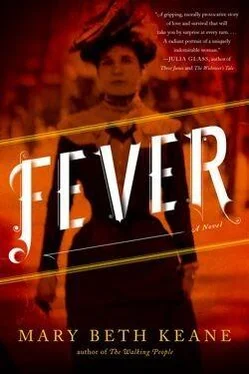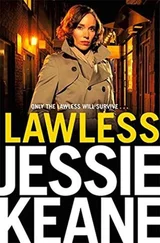“I’m to get an ambulance.”
“Well, go!”
Alfred ran. He pumped his arms and lifted his knees and dodged pedestrians who stepped before him. The faster he ran, the younger he felt, and though his errand was serious he felt buoyant: Mary was back. She would forgive him. They would make up, and he would leave Liza. He and Mary would find new rooms together; he’d get good work. He leaped over a pile of horse manure. He nodded to the wandering sausage man, who watched him pass with amazement on his face. How could he refuse marriage to her now when he had asked Liza Meaney? Maybe Mary wouldn’t want to marry him now; maybe she had no interest. It didn’t matter. None of it mattered. Not so long as they lived together again and came home to each other every night.
When he returned to Driscoll’s rooms, Mary had taken over Mrs. Borriello’s spot by the bed and was talking to the doctor. Mrs. Borriello sat at the table with her head in her hands.
“What is it?” Alfred asked from the frame of Driscoll’s bedroom door.
“Looks like hasty consumption,” Mary said without turning.
“They’ll take him to a sanatorium,” the doctor said. “Each of you should watch yourself for symptoms and at the first sign you should segregate yourself.”
It was nearly midnight when the ambulance took Michael Driscoll, and once the neighbors retreated from their perches on the landings where they’d watched the spectacle, Mary remembered what the nurses used to do at Riverside after tending to a patient, and instructed Alfred and Mrs. Borriello to wash their hands. Mary knew Alfred was looking at her as he leaned against the wall that divided the kitchen from the bedroom. She hardened her belly and kept her eyes from meeting his. She spoke to him as if he were anyone, someone she’d just met, not the man she’d loved since she was seventeen years old. “When you get home you should wash yourself well. Boil your clothes or throw them away.”
Now that Driscoll was at the hospital there would be no need for Alfred to come around anymore, and if he stopped coming, then this, an interval of several hours, wouldn’t mean anything and she could go back to pretending he didn’t exist. She heard him draw his breath as if to speak but then release it again.
Mrs. Borriello took Mary by the hand.
“Hold on,” Alfred said, taking two quick steps toward the door as if to block it. “Mary,” he said softly. “Can I come up to talk a minute? Or can we take a walk?”
“It’s the middle of the night!” said Mrs. Borriello.
“She can speak for herself.”
“Why?” Mary asked.
“I have to talk to you, Mary.”
“Another time maybe,” Mary said, and Mrs. Borriello followed her boarder out the door.
Upstairs, the boys asleep, Mary found Mrs. Borriello’s largest pot and filled it with water. She filled the kettle, too. Once the water was boiled, the women took off their dresses, and their underclothes, and shoved them to a corner of the kitchen. Mrs. Borriello stepped into the bath first while Mary dropped their underwhites into Mrs. Borriello’s pot and stirred them like she was checking on a stew. Then Mary bathed while Mrs. Borriello stirred, the water at such a rapid boil the pot hopped on the stove. When they were both dressed in fresh clothing, their damp hair loose around their shoulders, their undergarments drying over the sink, Mary made coffee and poured it into two cups. Mrs. Borriello yawned. The kitchen was warm, and comfortable, and Mary’s body felt clean and soft under the fresh clothes. Mrs. Borriello stretched her arms over her head and purred.
“What’s your first name?” Mary asked.
“Emilia. My family called me Mila.”
“Pretty.”
“Not many call me Mila now.”
“No.”
The clock on the mantel ticked its rhythm and Mary remembered Aunt Kate, how they’d sit in the silent kitchen until late, Kate sewing, Mary sipping tea and reading aloud from the newspaper, until it came time to go to sleep.
Mila Borriello began smoothing her fine black hair, first one side, and then the other. She pulled it away from her face and twisted it behind her head. In only her camisole, and with her cheeks still rosy from the steam of the bath and the warmth of the room, Mary could see that she was still a beautiful woman.
“How old are you?”
“I am thirty-four years old.” Mila smiled. “You thought older?”
Mary nodded. The two women regarded each other in silence.
“I was married before,” Mila said. “Before Salvatore.”
“I didn’t know that.”
“Of course not. How would you know?”
Mary waited.
“His name was Alberto. Is Alberto. He’s still alive someplace, I don’t know. Last I saw him was in Naples.”
Mary felt the room seem to settle down around them. Her hand rested on the table not six inches away from Mila’s hand. She’d never invited her, Mary considered now. She’d never asked her up for tea or coffee, or knocked on her door to see if she needed anything from the market. When Mary, Fran, and Joan made a plan to go put their feet in the fountain, or walk in the park, they’d never asked if Mila Borriello felt like joining them. Alfred sometimes wondered why the Borriellos didn’t live downtown on one of the Italian streets, but mostly they didn’t think of the Borriellos at all.
“This Alberto, he was father to my oldest boy. You remember.”
The drowned boy, also Alberto. They called him Albie. Albertos become Albies in America.
“I’m not sure I understand.”
“He was not such a good man, Alberto. In some ways, yes, a decent man, he always made good wages, but in most ways, not such a good man. He loved me, and loved his boy in his way, but he was not the way a man should be. He lifted his hand to me every day and I knew he would lift his hand to my boy. Maybe he would wait until my boy got strong, but maybe not. At first I thought I could spend a little less, sit a little less, but then I saw he would do it anyway and I’m not a woman who deserves hitting. So one day he beat me with the leg of a chair and I left him. I took the boy while he was out of the house and stayed with a woman neighbor, and then I came to New York City and called myself a widow. Then I met Salvatore in America and told him all of it. Some men, they would leave a woman who told him a thing like that. Some men would side with the other man even not knowing him, even the man all the way in Naples. Not Salvatore. He believed me and trusted me and then we had our own two boys, Carmine and Anthony. He was kind to me every day of his life.”
Mila looked at Mary very seriously. “They don’t know this, Carmine and Anthony. They think Alberto was their full brother, their father’s son.”
“I understand.” Mary remembered that horrible afternoon. “I’m so sorry about Salvatore. And about Albie. We never talked about—”
“It’s fine,” Mila said, and set her mouth in that familiar way she had, a widow’s pursed lips, worried brow.
They were quiet for a long time.
“I don’t think of that day too much. Sending them out for wood. Much more I think of before we came here, when it was just the two of us, that baby with me on the ship, and how careful I was to give him the cleanest portion of the sheet, and the best of what we had at meals. You’ve never seen a baby cling the way Alberto clung to me in America when we got here first. Sometimes it’s hard to understand that that baby turned into my boy. That that baby disappeared, and turned into a boy, and then that boy disappeared. So he left me twice. Do you understand?”
“Your English is very good.”
“I don’t mean my English. I mean do you understand about having a baby and worrying sick over him and finally getting him away from a dangerous thing and then having so much good happen and then the baby grows into a handsome boy and then he is gone? One, two, three, gone. I pushed him out of me, and nursed him, and soothed him, and then one day he left here and didn’t come back. Like he was nothing and everything I felt for him was nothing and all that time we felt it was good, and strong, and special, it was really no stronger than a strand of hair snipped in two.
Читать дальше












